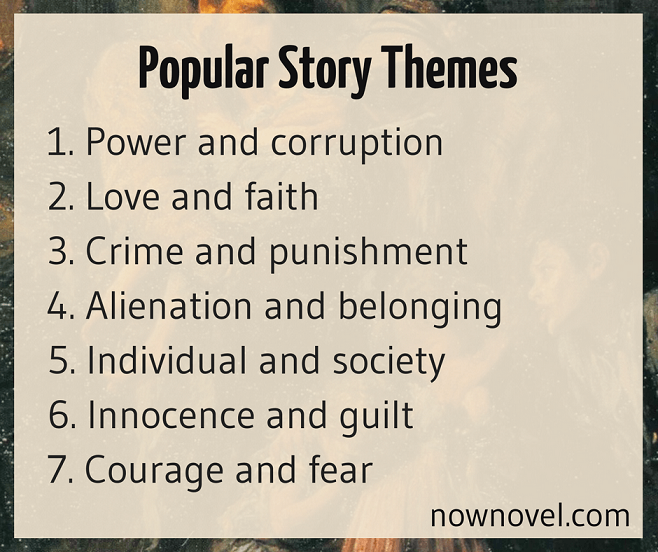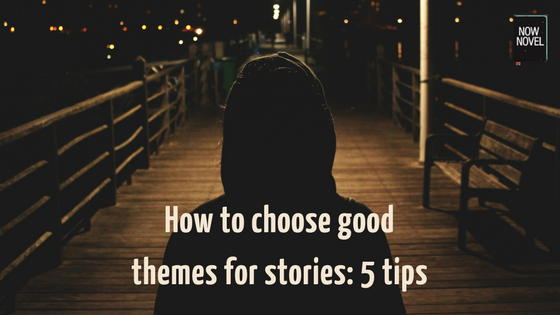A theme, ‘an idea that recurs in or pervades a work of art or literature’, explores an insightful topic or subject. Through the ways authors treat themes such as ‘love’, ‘alienation’, ‘hope’ and more, we learn and grow through their characters’ experiences of these themes. How do you choose good themes for stories?
1: Think about common themes for stories in your genre
2: Match themes with characters’ personalities and goals
3: Write up a list of themes and potential sub-themes
4: Examine how great authors have treated similar ideas
5: Deepen your treatment of themes after your first draft
Let’s explore each of these ideas further:
1: Think about common themes for stories in your genre
Each genre of writing has core common themes. Romance, for example, typically has themes relating to human relationships since this is its focus. Common themes in romance fiction include:
- Love and power – the popular Fifty Shades series explores power in both the non-sexual and sexual aspects of a relationship, for example
- Commitment – what it means to choose another person romantically
- Obsession – Paula Hawkins’ The Girl on the Train is a good example of a novel that explores romantic obsession and its dangers, as it follows a character stalking her ex-husband
- Gender relations – much romance explores the way people in relationships behave according to (or refuse) society’s gender expectations
As you can see, there are many themes you could explore in a romance. You might explore how two lovers navigate their gender differences and the baggage attached to this. Your story could, like a Nicholas Sparks novel, show the ingredients required for commitment to last – perseverance, self-knowledge, faith, desire and more.
Consider how themes differ between fantasy and romance. Although there is often overlap (if there is a love interest), fantasy novels often include themes of:
- Heroism – what do ordinary people need to commit extraordinary deeds?
- Friendship – how can allies defeat evil where solo attempts fail?
- Power (and its social and personal cost or danger) – fantasy novels, from The Lord of the Rings to Harry Potter, often explore the strife that results when individuals seek excess power. This theme is also developed in magic and magical abilities, as characters typically pay a price for their powers
List common themes in your genre when you create an outline. It will remind you of your diverse story theme options.
2: Match themes with characters’ personalities and goals
Reflect on characters you’ve sketched when you plan themes. Say, for example, you have a character who, like Tolkien’s Gollum, is treacherous and jealous. The theme of jealousy (specifically, its pitfalls) would then be something to develop through this character’s arc.
Indeed, through The Hobbit and the Lord of the Rings cycle, we see how Gollum’s lust for the One Ring and its powers transforms him. He changes from a ‘Stoor Hobbit’ to an eerie, cave-dwelling husk of his former self. Gollum’s goal – to obtain and keep the ring at all costs – drives him to murder. Tolkien shows how giving in to jealousy and other base emotions can rob a person of their humanity.
To choose good themes according to characters’ goals:
- List each character’s core goals. In a romance, for example, it might be a character’s desire to ‘settle down’ with a romantic partner.
- Then list themes that come with these goals (in the case of ‘settling down’, commitment and its pleasures and pitfalls, for example).
- Think of other themes that might be interesting to explore in parallel. For example, if your character’s greatest goal is to find a long-term lover, themes could include the risks of placing your hopes and dreams in another person.
Thinking about themes and characters together will help you create character arcs on interesting ‘universal themes’. Universal themes are the enduring ideas about human experience that multiple stories illustrate in their individual ways. Ideas such as ‘love takes work’ or ‘power corrupts’.
3: Write up a list of themes and potential sub-themes
Once you have the central idea of your story or novel, write up a list of possible themes and sub-themes. For example, take the central idea of Franz Kafka’s novella The Metamorphosis: ‘A travelling salesman wakes up to discover he has turned into a vermin-like critter.’ From this premise, the primary themes could (and do) include:
- Alienation or estrangement. How might such an extreme change affect personal relationships? We see Gregor Samsa’s family struggling to live with the sudden creature in their midst
- Sympathy and its limits or conditions. How will a person’s extreme transformation affect people’s sympathies? How reliant is our care on the other person being familiar to us rather than strange?
- The link between mind and body. How might a radical change in form change someone’s mind, their wants, needs and desires? Kafka explores this (we see Gregor the vermin seeking out closed, private spaces at first)
Taking each of the above broader themes, we can list sub-themes for each. Sub-themes for ‘alienation’, for example could include:
- Our need for social interaction. What results when others find us repulsive suddenly? At first, Gregor is afraid of frightening his family and hides. Yet as he adjusts to his new appearance, he becomes bolder. When he starts to climb the walls, his mother sees him and passes out. This leads to conflict
- How to resolve alienation. Beginning with Gregor’s alienation, we see him trying to reconcile the change with his immediate environment. We also see the dramatic consequences that result when his father throws apples at him, seriously injuring Gregor
4: Examine how established authors have treated similar ideas
An excellent way to increase your skill at developing story themes is to examine how other authors have treated similar ideas. Other classic examples of fiction exploring alienation include Dostoevsky’s Crime and Punishment and Albert Camus’ The Stranger.
In Dostoevsky novel, Rodion Raskolnikov grows alienated from family and friends after he commits murder. Reintegration into society becomes impossible for the already-alienated character from the moment of the murder. Dostoevsky explores the related themes of guilt and madness, as the former drives Rodion to the latter.
In Albert Camus’ L’etranger (translated in English as The Stranger), we also see the links between alienation and criminality.
The central character, Meursault, shows indifference to surrounding society. At the start of the novel, Meursault expresses no emotion at his mother’s funeral. After Meursault shoots and kills his friend’s girlfriend’s brother, he is tried for the killing. In the trial, the prosecutor notes Meursault’s inability to cry at the funeral. This is treated as proof of his guilt and ‘monstrous’ nature. Camus thus explores the cost of alienation, of being unable to obey society’s most basic rules.
Both authors explore alienation and the worst case scenarios that can result. In a criminal context, both characters must do penance for their crimes.
In Rodion’s case, his conscience demands responsibility. Meursault differs, because his guilt is known but he expresses no remorse. In Meursault’s case, pressure to express remorse and to take responsibility for his crime comes from others.
The different roots of alienation in these two characters mean we get two very different examinations of the theme, though both characters essentially commit murder.
As you read fiction, be alert to these details, the similarities and differences in how authors treat common, universal themes. It will help you develop your themes with similar skill.

5: Deepen your treatment of themes after the first draft
Examining theme from the start of a first draft isn’t for everyone, of course. Pantsers often prefer to not think too deeply about the connecting parts of a story at first. They often prefer to find (and create) links between scenes, characters and themes in later revisions.
Whether you tend to plan your themes ahead of time or watch them emerge as you draft, do think about theme when you revise.
In Crime and Punishment, for example, one could imagine a first draft where Rodion’s crime is the sole focus of the story. Yet in the novel, Dostoevsky also tells the story of Katerina Marmeladova. Katerina, a tuberculosis-stricken and impoverished widow, is proud and haughty, having come from a wealthy family.
We see a parallel alienation to Rodion’s own in how Katerina holds herself above others. Yet Katerina does so out of pride, often reminding others of her wealthier youth. Katerina and Rodion thus show two opposite sources of alienation. In Rodion’s case, the primary driver of his estrangement from others is shame. In Katerina’s case, it is pride.
This character parallel and the multiple ways Dostoevsky examines alienation makes the story richer. We see how alienation can have similar root sources (poverty and the exclusion that can result). Yet we also see the dissimilar character responses (shame and pride) that both lead to alienation.
When you revise your story or novel, think about how characters can show other sides of your themes. If, for example, a primary relationship explores the theme of ‘commitment’ , consider a secondary character arc that demonstrates negatively what can tear commitment apart (infidelity, for example, or lack of trust). These contrasts and echoes enrich a novel, giving us multiple angles on the same story themes.



5 replies on “How to choose good themes for stories: 5 tips”
A very helpful explanation clarifying theme and subject – thank you
It’s a pleasure, Nicoli. Thanks for reading!
Great tips. This is especially useful since I am an aspiring writer/author. I write books from my own imagination on wattpad. So advice is crucial for me. This is great. 🙂
Thank you, have an inspired and creative week!
This was more helpful. My new novel is about Alienation and Belonging. What if you found out you aren’t who you thought you were and for 29 years you and your now deceased mother were living her lie? Casey begins a journey to find out who she really is by finding out how her “mother” acquired her.